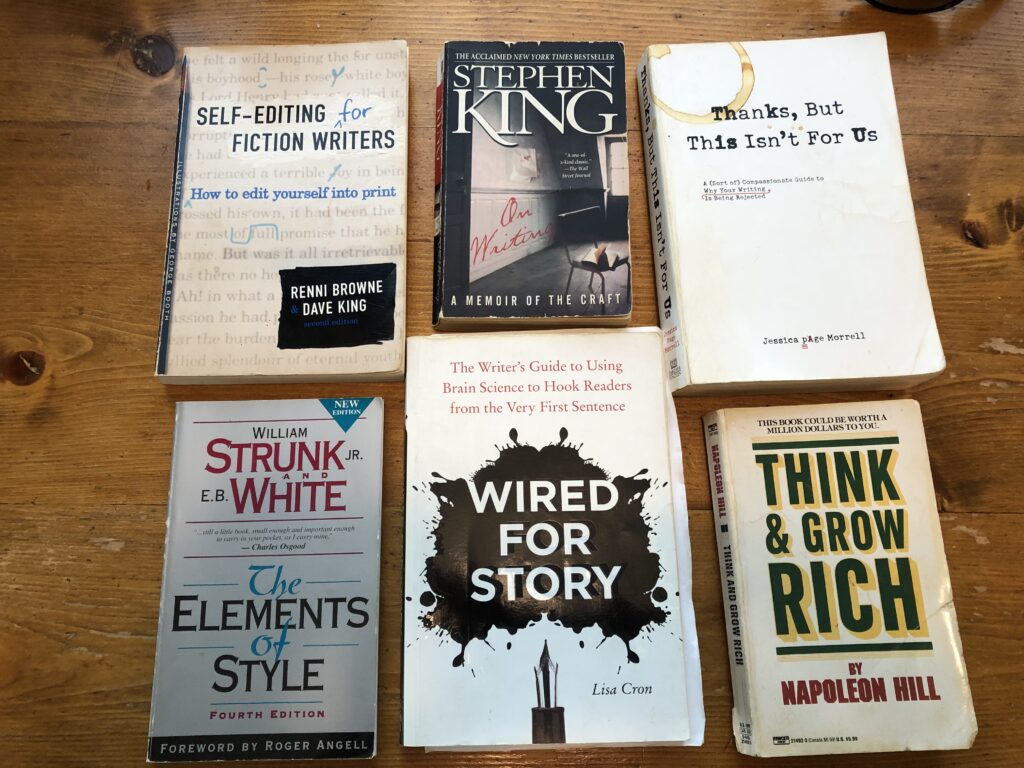For a fiction writing seminar I’m part of this weekend, I’m presenting to the class five resource books that influenced me the most over the years. I’ve got a lot of material stashed away on shelves, in boxes, and under the bed (not to mention what’s cached on my computer). It wasn’t hard, though, to fish out the best which I’ll share here on the Kill Zone.
1. Think & Grow Rich.
This gem isn’t everyone’s birthstone. The original version, published in 1937, is written in an old-style masculine tone that reeks of misogyny. There are current versions published in a gender-neutral, more modern tongue but setting that aside author Napoleon Hill identifies seventeen core principles of personal achievement: Definiteness of Purpose, Mastermind Alliance, Applied Faith, Going the Extra Mile, Pleasing Personality, Personal Initiative, Positive Mental Attitude, Enthusiasm, Self-Discipline, Accurate Thinking, Controlled Attention, Teamwork, Learning From Adversity and Defeat, Creative Vision, Soundness of Health, Budgeting Time and Money, and Developing Strong Positive Habits.
Napoleon Hill published two earlier editions of his research. One was titled The Science of Personal Achievement. The other was called The Philosophy of Success. Both sounded too heady, so Hill rebranded a condensed version into Think & Grow Rich. From over four decades of being a Napoleon Hill student, I can confidently say the main theme in T&GR is not money. It’s about wealth gained from the satisfaction of accomplishment like writing and publishing a book.
2. On Writing — A Memoir of the Craft
Stephen King originally released On Writing in 2000 when he had only like a zillion books out, nothing compared to the spazillion he’s penned out today. The first half of On Writing deals with his personal story of depression, addiction, and chronic pain. The remainder is pure adrenaline to any writer, regardless of genre or slotting.
King does not wash words. He doesn’t choke back the F-word, and he gives you straight goods like, “There is a muse but don’t expect it to come fluttering down into your writing room and sprinkle creative fairy dust on your typewriter.” How about, “If you don’t have the time to read, you don’t have the tools to write. Simple as that.” Or, “Writing isn’t about making money, getting famous, getting dates, getting laid, or making friends. In the end, it’s about enrichening the lives of those who will read your work, and enrichening your own life, as well.”
3. The Elements of Style
No kid should graduate high school English without passing an exam on this primer originally released in 1935 by William Strunk Jr. It was revised by E.B. White (author of Charlotte’s Web) somewhere in the 50s or 60s, and I have a copy of the fourth edition circa 2000. A well-worn, underlined and highlighted fourth edition.
In 104 pages, The Elements of Style is a Cliffs Notes of my 1500+ page The New Lexicon Webster’s Encyclopedic Dictionary of the English Language. It’s broken into five short parts covering Elementary Rules of Usage, Elementary Principles of Composition, A Few Matters of Form, Words and Expressions Commonly Misused, and an Approach to Style (With a List of Reminders). There’s a lot of power in this little book.
4. Wired For Story
Lisa Cron subtitled her book The Writer’s Guide to Using Brain Science to Hook Readers from the Very First Sentence. If you haven’t watched Lisa’s TedxTalk, do not miss out on her message. It’s vital fiction writers have a basic understanding of brain science as it applies to storytelling.
I just opened my paperback version and read this passage that I transposed from the text and printed on the inner jacket. “The goal is not to write a story that focuses on the plot. Rather, a plot that forces the protagonist to come to grips with the inner issue that’s keeping her from solving the story question and attaining that goal. Her inner struggle is her real problem, and the reader’s question isn’t will the protagonist solve the mystery, it’s what will it cost her emotionally to solve it”. Wired For Story is full of this stuff.
5. Self-Editing for Fiction Writers / Thanks, But This Isn’t For Us
I said I was going to list my five top writing resources and I had to tie two fiction editing books that I’ve carved up. The first must-read is by Renni Browne and Dave King. The second must-know is from Jessica Page Morrell. Although they cover the same subject—self-editing your fiction work to make it more saleable—the authors take two different and interesting approaches to delivering what could be boring matter.
Brown and King subtitle their work How to Edit Yourself Into Print, and they do an excellent job of fiction instruction such as explaining core rules of show &tell, characterization, exposition, dialogue, and a lot more. Morrell, who subtitles hers A (Sort of) Compassionate Guide to Why Your Writing is Being Rejected, writes more from a critical editor’s point. Both resources are keepers, just like I’d never part with the other writing treasures listed here.

Kill Zoners — Let’s get a discussion going. Who has read any or all six of the five on this list? If you were writing this piece, what are the top writing resources you’d recommend? (That can include websites, seminars, or whatever you think can help us up our game.) And if I can ask you to be bold, who’s written and published a writing resource they’d recommend to this gang?
